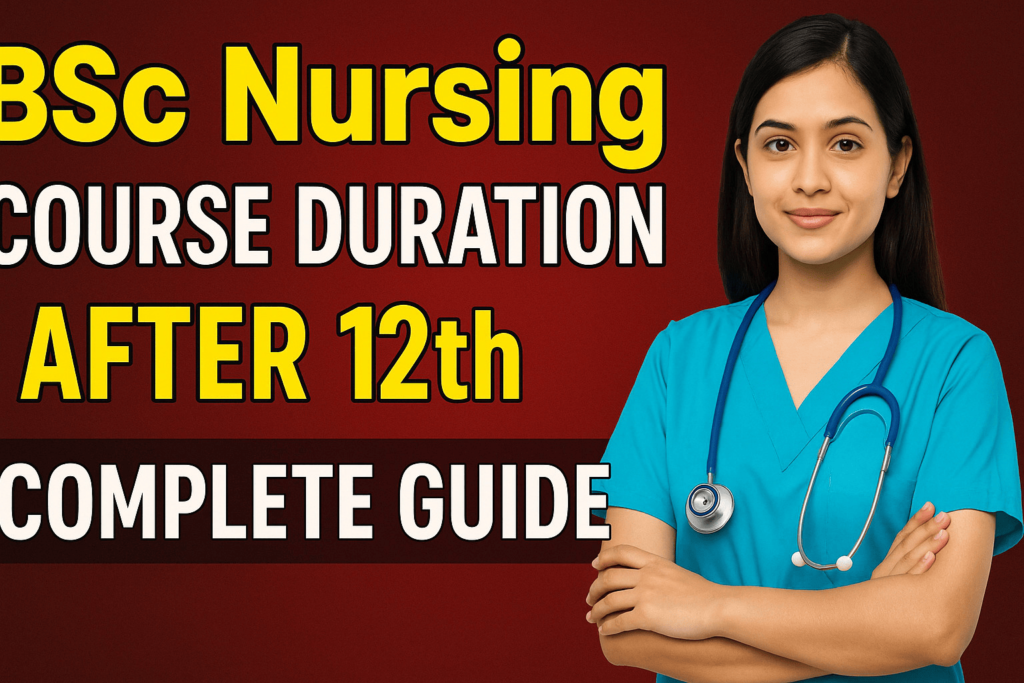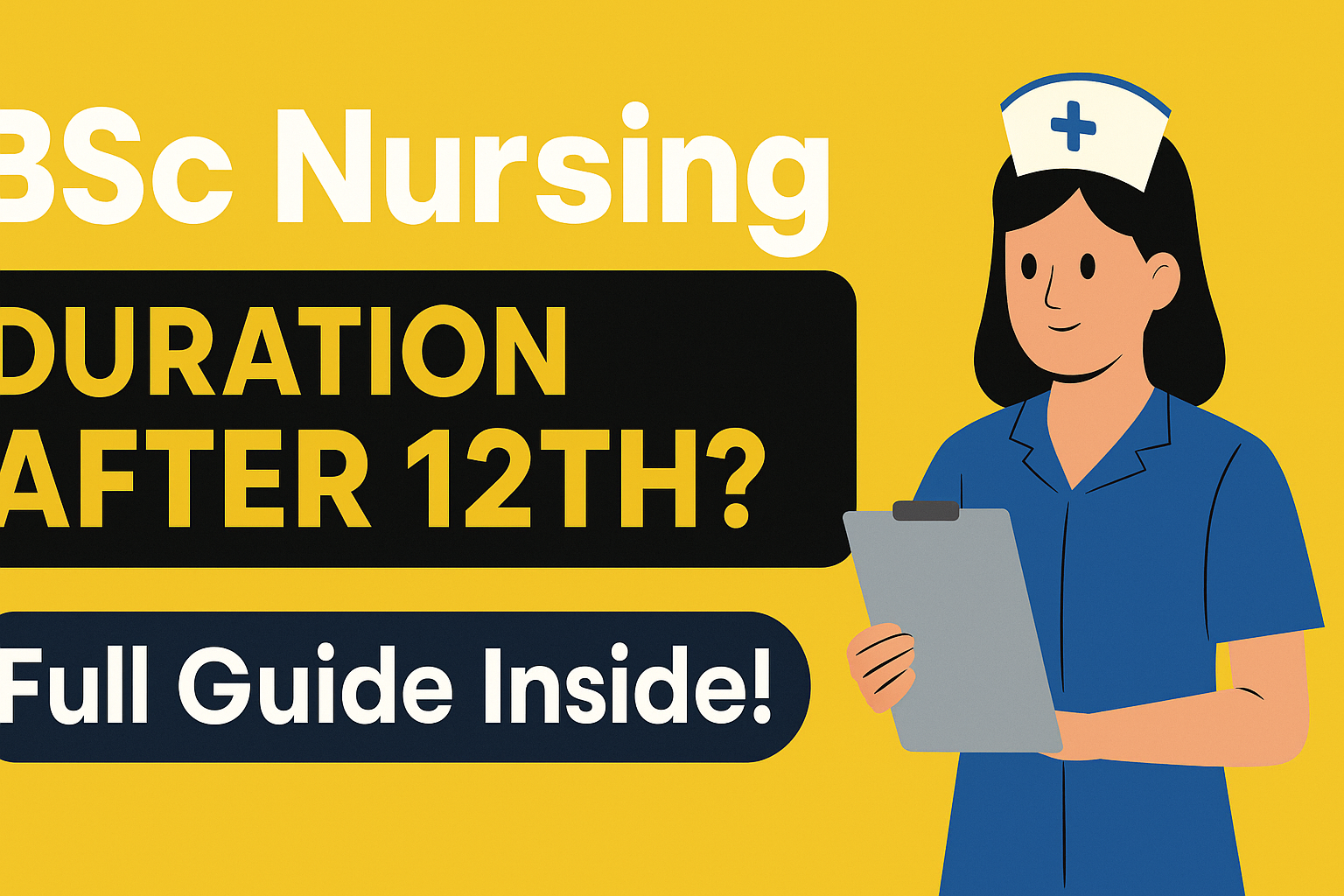The profession of nursing remains one of the most honorable choices for a career because it provides numerous career paths throughout India and worldwide. A career in healthcare seems like an ideal choice for anyone who finished their 12th grade because the BSc Nursing course stands as one of your top choices. This complete guide explores three essential attributes of a BSc Nursing course program after completing 12th grade along with its educational journey and future professional prospects for nursing students. This article supplies essential information about the BSc Nursing course that helps you decide better

Introduction to the BSc Nursing Course
Nursing practice grows dynamically to address the current healthcare demands. Students who earn theirBachelor of Science in Nursing BSc Nursing Course Duration After 12 professional degree gain admission into diverse healthcare rol
es across hospitals and community health centers as well as clinics and other healthcare facilities. Most applicants struggle to find the right information regarding how long BSc Nursing courses last after completing their 12th year. You need to understand the total time requirements as well as the program structure to create a successful high education and professional pathway.
The length of BSc Nursing course studies in India after passing 12th grade amounts to four academic years. The four-year curriculum enables students to acquire practical nursing skills and theoretical theoretical knowledge needed to handle nursing responsibilities
Course Duration and Structure
Duration: Four Years
Students pursuing BSc Nursing in India will need four years to fulfill their educational requirements after finishing 12th grade. Students will spend four years on the BSc Nursing program through eight semesters which address distinct nursing topics both in theory and practice. The college curriculum extends to four years to enable students to adequately learn nursing subject matter along with essential practical experience required for healthcare work
Semester-Wise Breakdown
- Semester 1 & 2: Foundation and Basics
Foundational knowledge in nursing and healthcare begins during the starting two semesters of education. Students begin their education by studying human anatomy and physiology and microbiology while gaining intuition to community health basics. Most first-year subjects make up this introductory phaselike nutrition, psychology, and communication skills essential for patient care.
Semester 3 & 4: Intermediate Studies and Clinical Skills
The curricular focus of the training schedule transitions to medical-surgical nursing and pharmacology and nursing research during the middle segment of the course. The curriculum progresses toward practical components such as lab work and simulated healthcare training that provide real-world learning experience to students - Semester 5 & 6: Specialized Nursing Areas
As students progress, they delve into specialized areas including obstetrical and pediatric nursing, mental health nursing, and community health practices. These semesters are characterized by intensive clinical practice, working in hospitals or community settings to gain practical exposure. - Semester 7 & 8: Advanced Practice and Internship In the final year, students not only consolidate their theoretical knowledge but also undertake an extended internship that is crucial for real-world learning. The final semesters focus on holistic patient management, health education, and management techniques. During this phase, the BSc Nursing syllabus is comprehensive and prepares students for independent practice as well as further studies.
Integrated Clinical Practice
The four-year course integrates clinical education as its fundamental core educational requirement. Students practice at hospitals and community centers by implementing classroom knowledge to actual healthcare scenarios. Clinical exposure provides invaluable learning because future nurses can build their patient handling skills while developing better understanding about teamwork and experiencing actual patient care practices
Eligibility Criteria: 12th Percentage and Other Qualification
One of the primary considerations for candidates considering a BSc Nursing course is the eligibility criteria, particularly the academic requirements at the 12th grade level.
12th Percentage Required for B.Sc Nursing
In Indian higher learning institutions students need to demonstrate minimum 12th-grade grades ranging between 50 to 60 percent. The particular entrance percentage applicants must meet before enrollment changes across educational institutions although prestigious colleges often set their entry standards higher. Students applying to colleges must verify the particular admission criteria of each university they consider
Additional Qualifications
Apart from the academic percentage, candidates must also meet other criteria, including:
- A background in science subjects, particularly biology, is essential.
- Some institutions might require proficiency in English, either through a minimum score on certain standardized tests or through direct evaluation.
- In some cases, a physical fitness test may be required, given the demanding nature of the nursing profession.
Maintaining a strong academic record in 12th grade is important not only to meet the entry requirements but also to lay a solid foundation for the challenging and rewarding curriculum ahead.
Course Fees: Government vs. Private Institutions
Money issues normally influence students when they make decisions about BSc Nursing courses. The main question among prospective nursing students explores BSc Nursing tuition costs between public and private educational institutions.
BSc Nursing Course Fees in Government College
The tuition fees at government colleges within India enter the market with lower rates than the fees established by private academic institutions. The BSc Nursing course fees in government colleges have set limits determined by state or central government agencies resulting in tuition costs from INR 10,000 to INR 50,000 annually. Government institutions receive funding from public authority budgets that enables them to offer subsidized educational expenses. Students
attending government colleges can access free scholarships from the institution on top of lower tuition costs.
BSc Nursing Course Fees in Private Institutions
Higher fees exist at private institutions because they maintain advanced infrastructure and additional educational assets and specialized facilities which result in better educational depth. Private educational institutions set differing costs which start at INR 50,000 per academic year but the higher ranges of tuition may exceed multiple hundred thousands of Indian rupees based on college recognition and facilities and site. Students must evaluate their investment returns and educational quality standards when they select a private educational institution.
Nursing Courses After 12th Fees and Financial Planning
Apart from the tuition fees, there are additional costs involved in pursuing a nursing course, including:
- Uniforms and Lab Equipment: Many courses require the purchase of specific uniforms, stethoscopes, and other instruments.
- Examination Fees: Periodic assessments and licensing exams may incur additional fees.
- Hostel and Travel Costs: For students relocating for their studies, accommodation and daily travel expenses can add up.
Effective financial planning is key. Ensure you check all aspects of the fee structure before enrolling, and explore scholarship options if necessary. For more information and resources on nursing education, you may visit https://medvriksha.com/
Career Prospects: BSc Nursing Salary and Beyond
One of the most promising aspects of pursuing a BSc Nursing course fees is the rewarding career opportunities available after graduation. Nursing not only offers the chance to make a tangible impact on lives but also comes with competitive compensation packages.
BSc Nursing Salary: An Overview
Nursing is a critical profession, and salaries reflect the demand and importance of the role. BSc Nursing salary after graduation typically depends on factors such as:
- The type of healthcare institution (government, private hospital, community health center)
- Geographic location
- Level of experience and additional certifications
Entry-Level Salary
Fresh graduates in nursing may start with a salary ranging from INR 20,000 to INR 30,000 per month, with some government positions offering even higher pay scales depending on the state and role.
Experienced Professionals
The salary of a registered nurse significantly raises through experience acquisition combined with more advanced qualifications along with specialized training. A nursing professional who adds certifications along with managerial roles can bring home monthly earnings exceeding INR 50,000 and extending to over INR 1,00,000 or more. The salary trajectory within nursing profession continues to ascend thus offering both meaningful service opportunities and worthwhile financial rewards
Career Growth in Nursing
Nursing is a field with immense scope for career progression. After gaining some years of experience, you can advance into roles such as:
- Charge Nurse or Nurse Supervisor: Managing teams within a healthcare facility.
- Clinical Educator: Training future nurses and healthcare providers.
- Nursing Manager or Director: Overseeing entire departments and contributing to policy and decision-making.
- Specialization: Advanced practice roles in areas such as critical care, pediatric nursing, or mental health.
Continual professional development, additional certifications, and advanced degrees like the MSc in Nursing further bolster career growth and job satisfaction.
BSc Nursing Syllabus: What to Expect
Understanding the curriculum is vital for anyone considering a career in nursing. The BSc Nursing syllabus is structured to provide a blend of theoretical knowledge and practical skills over four years.
Key Areas Covered in the Curriculum
Basic Sciences and Nursing Foundations
Topics such as human anatomy, physiology, biochemistry, and microbiology form the core of the early semesters, providing a scientific basis for all subsequent studies in the field.
General Nursing Practices
Subjects in this area include fundamentals of nursing, nursing ethics, psychology, and communication. These courses help students develop essential bedside manners and patient interaction skills.
Specialized Nursing Subjects
As the course progresses, topics become more specialized
- Medical-Surgical Nursing: Dealing with the care of patients with various medical conditions.
- Community Health Nursing: Emphasizing public health and disease prevention strategies.
- Obstetrical and Pediatric Nursing: Focusing on maternal and child health.
- Mental Health Nursing: Providing care and support to patients with psychological issues.
- Pharmacology and Nutrition: Studying drug interactions and dietary requirements for various conditions.
- Clinical Practice and Internship A significant portion of the program is dedicated to clinical practice. Hands-on training in hospitals and community settings ensures that theoretical learning is supported by
practical experience.
Integrated Learning for a Holistic Approach
The BSc Nursing syllabus offers a combined approach that encompasses complete educational knowledge. Students receive an equal distribution of theoretical education with laboratory practice and clinical training until they are ready for healthcare work. Through seminars and research tasks students learn to develop critical thinking ability and solve problems
Why Pursue a Career in Nursing After 12th?
Deciding on a career is an important choice. For many students, the idea of helping others, combined with the promise of a stable and respected profession, makes nursing an appealing field.
Reasons to Choose Nursing:
Job Stability: With continuous demand in both public and private sectors, nursing offers high job security.
Opportunities for Growth: Continuous professional development can lead to advanced roles and leadership positions.
Global Opportunities: Nursing is a globally recognized profession, making it easier to work abroad.
Personal Fulfillment: The opportunity to make a direct impact on patient care and wellbeing is deeply rewarding.
The professional growth, combined with competitive salaries and diverse career paths, makes nursing one of the most sought-after courses after 12th grade. If you’re passionate about healthcare and service, a BSc Nursing course can open many doors.
Admission Process and Preparing for the Course
Eligibility and Entrance Exams
Admission to BSc Nursing programs often requires candidates to appear for entrance exams or participate in state-level counseling sessions. These may vary across different institutes. Generally, the process involves:
- Verification of 12th-grade marks (with a minimum required percentage)
- Entrance test performance (if applicable)
- Personal interview or group discussion in some cases
Preparing for the Course
Upon receiving admission it becomes beneficial to study both BSc Nursing syllabus content along with relevant coursework material. Basic understanding of biology and health science principles creates an advantageous starting point for your studies. You can prepare for BSc Nursing program challenges through preliminary courses offered by various online resources and e-learning platforms
Additionally, consider exploring:
- Workshops on communication and interpersonal skills, as these are essential for effective patient care.
- Online forums and student groups to get insights from current nursing students.
- Practical experience through volunteer work or internships in healthcare settings.
For additional resources and study materials, check out https://medvriksha.com/.
Frequently Asked Questions (FAQs)
Q1: What is the duration of the BSc Nursing course after 12 in India?
A: The BSc Nursing course typically lasts for four years, divided into eight semesters, and includes both theoretical studies and clinical practice.
Q2: How much do BSc Nursing courses cost?
A: The course fees vary. Government colleges usually charge between INR 10,000 to INR 50,000 per annum, while private institutions may charge significantly higher fees. It’s best to check with individual colleges for exact figures.
Q3: What is the typical BSc Nursing salary for a fresh graduate?
A: Entry-level salaries for BSc Nursing graduates can range from INR 20,000 to INR 30,000 per month. With experience and additional qualifications, this can increase substantially.
Q4: What percentage is required in 12th grade for admission into BSc Nursing courses?
A: Most institutes require a minimum of 50-60% in the 12th grade, especially in science subjects. However, requirements may vary depending on the institution.
Q5: Are there significant differences in fees between government and private institutions?
A: Yes. Government colleges generally offer lower tuition fees due to state subsidies, while private institutions tend to charge more based on their facilities and infrastructure.
Q6: What does the BSc Nursing syllabus cover?
A: The syllabus includes foundational science subjects, general nursing practices, specialized courses in areas such as obstetrical, pediatric and mental health nursing, and comprehensive clinical practice modules.
Q7: What career opportunities are available after completing a BSc Nursing?
A: Graduates can work in hospitals, community health centers, clinics, and many other healthcare settings. There are opportunities for advanced roles in management, clinical education, and specialized practice areas.
Q8: Can I pursue further studies after completing my BSc Nursing?
A: Yes, many graduates opt for further specialization through postgraduate courses (MSc Nursing) or other advanced healthcare courses to enhance their career prospects.
Final Thoughts
Selecting nursing after graduating from 12th grade enables students to derive professional fulfillment while actively improving the quality of life for others. The BSc Nursing program takes four years to complete through a combination of theoretical education and medical practice which leads students toward diverse career possibilities. The path to success in nursing after 12th grade requires complete knowledge about all aspects of the course which includes admission details and fee costs together with the complete curriculum and future job possibilities.
Healthcare sector exercises significant challenges yet its professional rewards and career progression make this journey highly rewarding. Research the program deeply while fulfilling academic standards while making financial preparations for studying nursing. Your dedication and passion along with proper preparation will help you establish a successful nursing career that satisfies you personally as well as professionally
learn more best study resource for bams student

